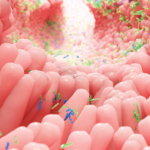To examine the antibodies more closely, the researchers purified total serum IgG and evaluated the glycosylation profile of the antibodies. They found that the antibiotic-treated mice had altered glycosylation profiles relative to untreated mice. Therefore, depletion of the microbiota at the time when the mice were mounting their arthritis-prone immune response was not only more effective than depletion of the microbiota prior to the induction of arthritis, but depletion of the microbiota at this later time shifted the ability of those antibodies to cause inflammation. However, the treatment did not affect the quantity of antibodies.
These findings raised the possibility that the antibiotics had a direct anti-inflammatory effect during the effector phase of arthritis. To evaluate this possibility, the researchers turned to the collagen antibody-induced arthritis (CAIA) model. In this model, scientists induce arthritis in DBA/1J mice by transferring a cocktail of five murine monoclonal antibodies to CII, thereby bypassing the need for the mice to develop an adaptive immune response. The researchers injected the anti-CII antibody cocktail on Day 0 and lipopolysaccharide (LPS) on Day 3. When they treated these mice with antibiotics, their arthritis severity was unaffected, suggesting that the antibiotics themselves do not modulate inflammation.
“[Although] it would be nice to extrapolate our study in mice to say that microbiome modulation may have an impact on the development of arthritis, it is too soon to know how well these results will translate to our patients,” says Dr. Kuhn.
Lara C. Pullen, PhD, is a medical writer based in the Chicago area.
Reference
- Jubair WK, Hendrickson JD, Severs EL, et al. Modulation of inflammatory arthritis by gut microbiota through mucosal inflammation and autoantibody generation. Arthritis Rheumatol. 2018 Mar 13. doi: 10.1002/art.40490. [Epub ahead of print]


